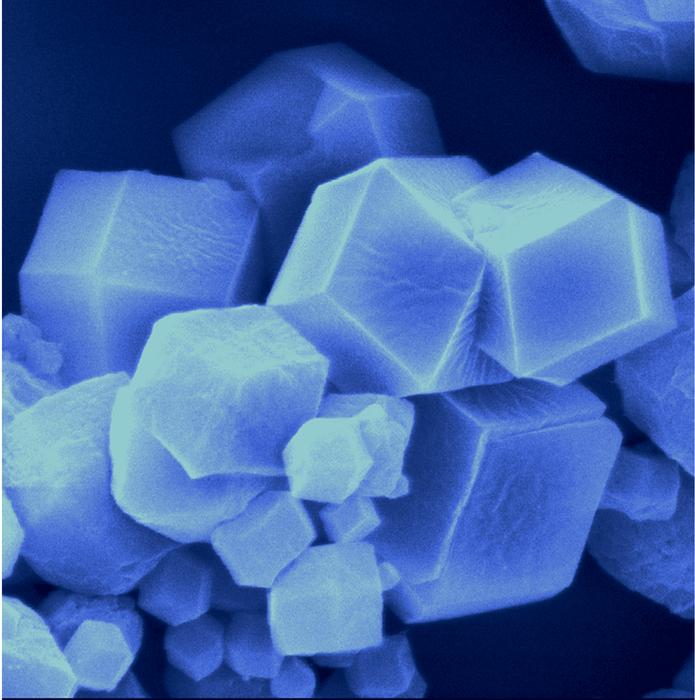
In a groundbreaking development within the realm of materials science, researchers at the Graz University of Technology (TU Graz) have unveiled a novel application of metal-organic frameworks (MOFs) to enhance food safety and reduce waste. This innovative endeavor is anchored in the ERC-backed project POPCRYSTAL, led by esteemed scientist Paolo Falcaro, who has recently been awarded an ERC Proof of Concept Grant for his new initiative, dubbed FRESCO. With this funding of €150,000 allocated over an 18-month period, the research team seeks to pioneer a new era in food packaging that intelligently monitors the freshness of perishable items such as fish, meat, and cheese.
At the core of this initiative is a specialized microporous crystalline composite that was meticulously developed during the POPCRYSTAL project. This composite has the extraordinary ability to detect toxic compounds, which tend to accumulate as protein-rich foods begin to spoil. The implications of this discovery are profound as they promise to not only protect consumer health but also mitigate the staggering levels of food waste that occur globally.
A particular focus of the research is the advancement of MOFs, which are characterized by their exceptionally high surface area relative to their size. This unique attribute opens the door to a multitude of applications, specifically in the detection of harmful substances. Falcaro’s previous achievements in manipulating the orientation of pores within these materials have paved the way for this promising extension of research. Leveraging collaborative efforts established through TU Graz’s pioneering Lead Project, “Porous Materials at Work for Sustainability,” the team has explored lithographic methods that hold great potential for practical applications in food safety.
The recent findings from this collaborative effort were highlighted in a publication in the prestigious journal Advanced Materials, showcasing the promising avenues that lie ahead for the development of MOF-based solutions. With the initiation of the FRESCO project, the focus shifts towards refining a sensitive ink that can be applied to food packaging, developing it into a game-changing tool for consumers and the food industry alike.
The innovative MOF developed during the earlier POPCRYSTAL phase will serve as the basis for creating this non-toxic composite ink. This ink operates on a simple yet effective premise: it changes color in response to the concentration of toxic compounds present in the packaged food. This property enables both consumers and producers to swiftly assess the edibility of food items, providing a vivid visual indication of freshness or spoilage.
The ambitious goals of the FRESCO project extend beyond the laboratory. Falcaro and his team are determined to refine the ink’s composition, conduct comprehensive effectiveness tests, and engage with partners in the food packaging sector to bring this innovative solution to market. This drive towards commercialization exemplifies the purpose of the Proof of Concept Grant, which underscores the potential for high-impact research to yield commercially viable innovations.
“Addressing the global challenges of food safety and waste reduction is paramount,” states Paolo Falcaro. He emphasizes the alignment of FRESCO’s objectives with the United Nations Sustainable Development Goals (SDGs), particularly those aimed at enhancing food safety and promoting responsible consumption practices. By equipping packaging with the ability to continuously monitor food freshness using MOF technology, there lies the potential to significantly reduce the unnecessary disposal of edible food while simultaneously protecting consumers from spoiled items.
The research activity in materials science at TU Graz has gained considerable recognition for its intensive exploration and tangible success in various domains. With numerous ERC grants already secured, the university boasts a robust foundation for advancing knowledge in this critical field. The work being done in areas like nanotechnology, sustainable construction materials, and mass transport systems through paper demonstrates the depth and versatility of TU Graz’s scientific inquiry.
As TU Graz continues to foster a vibrant research environment, the dedication to materials science, especially in the development of porous materials, remains steadfast. The university community, along with Vice Rector for Research Andrea Höglinger, applauds Falcaro and his team’s achievement in securing the ERC Proof of Concept Grant. This achievement not only stands as a testament to their relentless pursuit of research excellence but also underscores the global significance of their work in food safety innovation.
In conclusion, the burgeoning field of materials science at TU Graz, spearheaded by projects like FRESCO, illuminates the extraordinary potential of MOF technology in addressing real-world challenges. As the team delves deeper into developing the smart ink for food packaging, the implications for both consumer safety and sustainability could be monumental, heralding a future where food waste is significantly curtailed, and safety is assured through advanced materials.
—
Subject of Research: Development of Metal-Organic Frameworks for Food Safety
Article Title: Enhancing Food Safety with Smart Packaging Innovations
News Publication Date: [Insert Date]
Web References: [Insert URLs]
References: [Insert References]
Image Credits: Credit: PTC – TU Graz
Keywords
Food safety, metal-organic frameworks, MOFs, food waste, TU Graz, Paolo Falcaro, ERC Proof of Concept Grant, packaging innovation, sustainable materials, toxic compounds detection.





